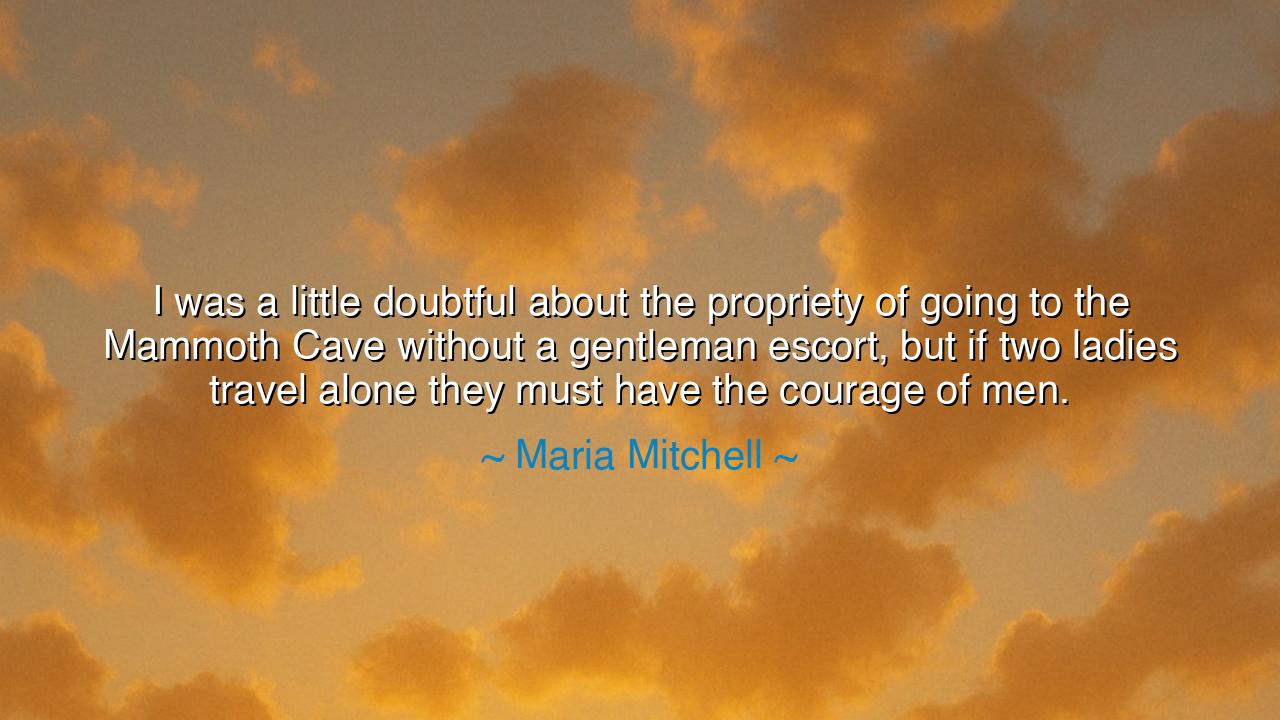
I was a little doubtful about the propriety of going to the
I was a little doubtful about the propriety of going to the Mammoth Cave without a gentleman escort, but if two ladies travel alone they must have the courage of men.






The astronomer and trailblazer Maria Mitchell, a woman whose eyes reached the stars even when her society tried to keep them lowered, once wrote: “I was a little doubtful about the propriety of going to the Mammoth Cave without a gentleman escort, but if two ladies travel alone they must have the courage of men.” In this simple reflection lies a revolution of spirit, clothed in the modest language of her time. For what Mitchell speaks of is not merely a journey to a cave—it is the timeless pilgrimage of women who dared to walk unguarded into the vastness of a world that told them they could not.
Born in 1818, in a world where women’s curiosity was often seen as dangerous, Maria Mitchell was the first American woman to become a professional astronomer. She discovered a comet with her telescope in 1847 and was celebrated across nations, yet she never ceased to face the quiet barriers of her age. Her quote, spoken with grace and understatement, reflects the social limits placed upon women in the 19th century. Even in travel, propriety demanded they be accompanied by men—as though courage and judgment were not virtues they could possess. But in those words, “they must have the courage of men,” Mitchell exposes both the constraint and the defiance of her time. She understood that to step forward as a woman in a man’s world required a double portion of bravery.
When she speaks of “the courage of men,” she does not mean to diminish women, but to challenge the narrow assumptions that denied them courage of their own. It is as though she says, “If society will only grant bravery to men, then we shall borrow that word until we make it ours.” Her journey to Mammoth Cave, one of the great wonders of the natural world, becomes a symbol of the greater journey women undertook—to explore not only the earth beneath their feet, but the limits of the roles imposed upon them. For Mitchell knew that if women waited always for permission, they would never leave the threshold. Courage, she implies, must sometimes wear disguise until it can walk freely in its own name.
Her sentiment finds echoes in the story of Nellie Bly, the journalist who, decades later, would circle the globe alone in seventy-two days. Bly, too, was told that such a feat was unthinkable for a woman—that she would fail, or worse, fall into ruin. Yet she went, undaunted, with the same courage Maria Mitchell invoked, proving that bravery is not bound by gender but by will. Both women defied propriety not with rebellion for its own sake, but with conviction that truth, curiosity, and freedom were holier than custom. Their courage was not loud or reckless; it was quiet, disciplined, and enduring—the kind that changes the world not in a shout, but in a steady, unwavering gaze.
Mitchell’s words also speak to a larger truth about fear and progress. Every explorer, every pioneer of mind or land, must confront the feeling that what they do is “improper.” Society has always labeled the unfamiliar as unseemly. Yet progress is born when the brave choose to walk anyway—through caves, through darkness, through the disapproval of others. To possess courage, then, is to act in the presence of fear, not in its absence. For courage is not the denial of fear, but the mastery of it. It is the moment when conviction outweighs conformity, and the heart dares to lead where permission is not yet given.
In the spirit of the ancients, her teaching endures: that courage, like light, must be carried forward by those who believe in it most. The journey to Mammoth Cave may seem small in the great history of exploration, yet it was a step toward something greater—the emancipation of thought itself. Mitchell’s courage was not just the courage to travel; it was the courage to think freely, to live beyond the walls others built for her. And in doing so, she illuminated a path that countless women, and indeed all seekers of truth, would later follow.
Let this be the lesson carried forward: to live nobly is to act despite fear, to explore despite judgment, and to seek knowledge despite resistance. Whether you are a woman breaking convention, a thinker defying ignorance, or a soul facing the darkness within, remember Maria Mitchell’s quiet rebellion. If the world denies you its protection, let that denial forge your strength. Stand tall, and take the courage that others claim as their own—make it yours, and make it shine.
For as the ancients would have said, courage is the mother of all virtue. Without it, no truth can be sought, no freedom won, no progress made. So when you find yourself at the mouth of your own “Mammoth Cave”—that place of uncertainty and wonder—step forward as she did. Take courage, not because the world grants it, but because the soul demands it. In that moment, like Maria Mitchell, you will not only discover the world—you will discover yourself.






AAdministratorAdministrator
Welcome, honored guests. Please leave a comment, we will respond soon